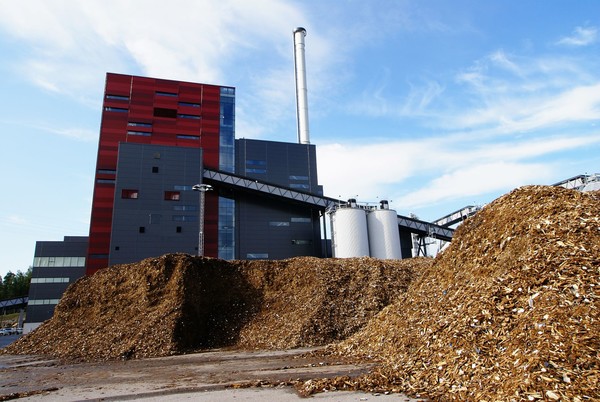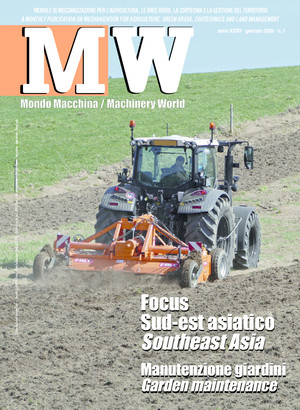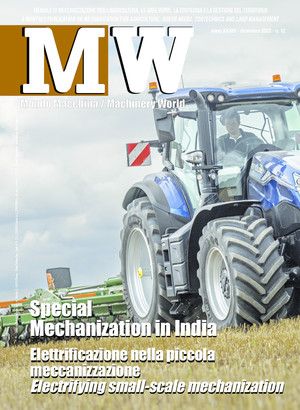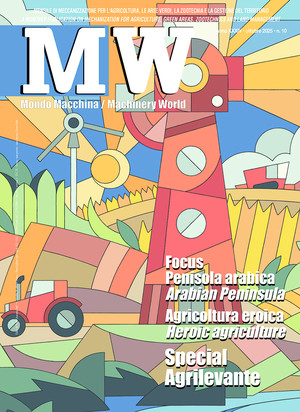
Green economy, a path that must be simplified
Italy is called to speed up the process of decarbonizing the economy, and the Recovery Fund could help this process in the agricultural and forestry mechanization sector as well
The European Green Deal’s focus on innovation and sustainability has somehow received a further boost from the many social and economic challenges exasperated by the Coronavirus pandemic. Today, ignoring the deniers’ opinions, everyone feels that the global system is creaking alarmingly, and the planet’s health must be taken care of if human health is to be preserved. The billions of Euros provided by the “recovery fund” could be a chance to boost Italy’s and many others’ recovery by implementing systemic strategies tailored to the needs of this complicated era. Nowadays, it is clear that ecology and economy can converge to produce mutual benefits, as shown by many recent market analyses.
According to the Circular Europe study “How to successfully manage the transition from a linear to a circular world” carried out by Fondazione Enel and The European House – Ambrosetti, in Europe, the sector is linked to a Gross Domestic Product of 300-380 billion euros (2018 figure) of which 27-29 billion euros in Italy. Meanwhile, the Circular Economy is linked to about 2.5 million jobs in Europe and 200,000 in Italy. The study shows that the transition from primary to secondary materials can significantly reduce greenhouse gas (GHG) emissions. Moreover, the study makes it clear that increasing the renewable sources share in energy production by only one percentage point means reducing GHG; up to 72.6 million tons of CO2 equivalent in Europe, and 6.3 in Italy (equal to about 50% of annual GHG emissions in the Municipality of Rome). Bearing these aspects in mind, it is no coincidence that 95% of European business leaders - interviewed in the research - believe that Circular Economy is a strategic choice for their company to gain a competitive advantage in diversification, market expansion, and cost reduction. Nevertheless, these same managers claim that, to date, certain elements such as uncertainty about value creation (43.6% of responses) and lack of skills (35.9%) are the most common obstacles to the development of the Circular Economy in the European countries.
Furthermore, particularly in Italy, sustainable production development such as, for example, biorefineries or energy from renewable sources, is also hindered by many regulations that add unnecessary burdens to the authorization procedures. The Legislative Decree of 16 July 2020 N 76 “Urgent measures for simplification and digital innovation”, whose conversion is underway between the Chamber of Deputies and the Senate, would have been an opportunity for improvement. Unfortunately, although the associations representing the companies of the sector have proposed clear and precise amendments to the text, the decree appears, in many ways, unsatisfactory, and we hear talking about “ complications decree” for the green economy and the RES (dealt with in Chapter III of Title IV). On the other hand, ironically, some benefits are introduced for the oil industry: reduced royalties on land and sea drilling, fewer authorization restrictions for building new pipelines.
Another critical aspect is the chronic difficulty of the territories in managing and implementing policies for sustainable development in our country. Specifically, the lack of technical expertise affecting both the administrations holding the Funds and the local administrations benefiting from them results in severe repercussions in the planning and management of the actions. ENEA has been working for years with Regions and Local Authorities to overcome these obstacles to design and implement interventions to improve energy efficiency, reduce energy consumption in the public sector and in the production sector, and stimulate virtuous processes in the circular economy. In this perspective, the ES-PA project (Energy and Sustainability for Public Administration) operates through actions supporting the entire national territory by preparing information and operational tools provided and shared with all regional and territorial administrations. Among the mechanisms implemented by the Project, there are the “Guidelines for the use of biomass plants” recently published by a team of researchers coordinated by Vincenzo Gerardi (ENEA Researcher and Member of the Board of Directors of ITABIA - Italian Biomass Association). The document, which consists of two volumes ( freely downloadable from the ENEA website*), was born from the need to identify a correct methodology for planning, building, and managing such energy plants. Part One describes the system of incentives and the technical-administrative aspects for carrying out the bureaucratic burden related to the various authorizations for the plants’ construction and operation. Part Two provides elements on state of the art and criteria for the technological choice of the multiple processes of energy conversion based on the type of biomass available, the energy needs in terms of quality and quantity, the actual production processes in which they fit, specifying the level of energy efficiency and investment costs to be expected for the different technologies. The Guideline ends with the presentation of some concrete examples of companies that have arisen over the years, in order to provide an overview of the different types of plants and the features that characterize them from a technological and managerial point of view, providing a picture of the operational realities of reference in Italy.
To conclude, the green economy path is undoubtedly the right one, but its achievement appears to be rather challenging. A series of valuable shortcuts lay in simplifying the regulatory framework (bureaucratic aspects) and spreading virtuous models (good practices).
To download the manual: register and access myES-PA
https://www.espa.enea.it/prodottiservizi/linee-guida-tecniche-e-seminari-sull-utilizzo-di-biomasse-nei-processid-impresa.html








